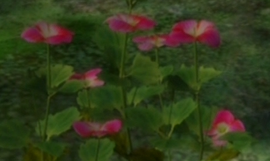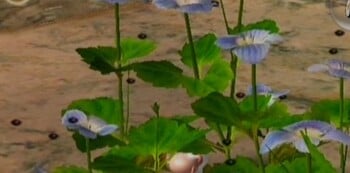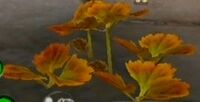Figwort
| Figwort | |
|---|---|

| |
| Appears in | N/A |
| Scientific name | Scrophularia xenomium |
| Family | Figwort |
| Areas | The Impact Site, The Final Trial, Valley of Repose, Awakening Wood, Wistful Wild |
| Attacks | N/A |
Figworts are tall, flowering plants used as scenery in both Pikmin games. In Pikmin 1, figwort plants sport bright blue flowers.
In Pikmin 2, figwort blossoms have adopted a deep pinkish hue which is thought to be the result of differing soil conditions; in fact, the color of some real-world flowering plants, bigleaf hydrangeas in particular, can vary from blue to pink/purple, depending on the acidity or alkalinity of the soil in which they grow. Although Pikmin 2 does not have the tiny black bugs from the first game, figworts may conceal larger creatures such as Doodlebugs or Unmarked Spectralids. In certain above-ground and cave locations, such as the Wistful Wild and White Flower Garden, dead or dormant figworts can be seen, possessing pale or red-orange leaves and without flowers.
“{{notes:enemy/{{{2}}}|block=y}}”
Insects

In the first game, disturbing certain flower clusters will unleash a swarm of tiny black bugs sometimes referred to by fans simply as "Figwort insects." They fly around briefly and quickly retreat, but cannot be harmed by Pikmin and do not affect gameplay whatsoever. These bugs have been known to congregate around Clovers as well, but are usually found within Figworts. No information about them is provided in the game. The plants they inhabit also show no signs of disease, so the relationship between the insects and plants is likely mutualism.
